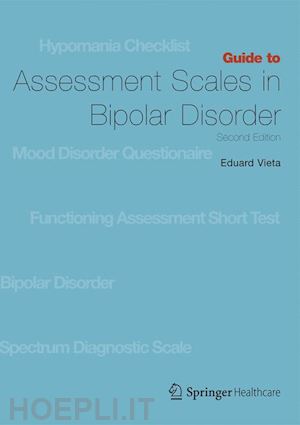
Questo prodotto usufruisce delle SPEDIZIONI GRATIS
selezionando l'opzione Corriere Veloce in fase di ordine.
Pagabile anche con Carta della cultura giovani e del merito, 18App Bonus Cultura e Carta del Docente
Building on the success of the first edition, this second edition has been extensively revised and updated to include recent developments in the assessment of bipolar disorder. Each chapter summarizes the key issues surrounding a particular area of bipolar disorder or bipolar spectrum disorder and presents the most commonly used scales in their evaluation. The evidence base in each chapter has been expanded and brought fully up-to-date. In addition, two new chapters have been added on assessment of functioning and assessment of suicide risk in patients with bipolar disorder. The assessment of functioning chapter introduces the newly developed and validated scale, the Functional Assessment Short Test, which assesses six major areas of functioning and is now widely used as an outcome measure in epidemiologic and observational studies. The assessment of suicidality chapter features the Columbia Classification Algorithm of Suicide Assessment which classifies suicidality based on empirical findings and predictive risk factors.
Written by a world renowned leading expert in the field of bipolar disorder, this second edition of a Guide to Assessment Scales in Bipolar Disorder is an essential reference for all clinicians and health professionals providing a concise selection of the key assessment tools for evaluating the patient with suspected bipolar disorder.
Eduard Vieta is Professor of Psychiatry and the Director of the Bipolar Disorders Program of the Hospital Clinic at the University of Barcelona, Spain. His program is dedicated to providing excellent healthcare for people with bipolar disorder, ducation and research, and has received worldwide recognition. Professor Vieta also serves as Director of Research at the Clinical Institute of Neuroscience at the same institution and has been an invited Professor at Harvard University, Boston, USA.











Il sito utilizza cookie ed altri strumenti di tracciamento che raccolgono informazioni dal dispositivo dell’utente. Oltre ai cookie tecnici ed analitici aggregati, strettamente necessari per il funzionamento di questo sito web, previo consenso dell’utente possono essere installati cookie di profilazione e marketing e cookie dei social media. Cliccando su “Accetto tutti i cookie” saranno attivate tutte le categorie di cookie. Per accettare solo deterninate categorie di cookie, cliccare invece su “Impostazioni cookie”. Chiudendo il banner o continuando a navigare saranno installati solo cookie tecnici. Per maggiori dettagli, consultare la Cookie Policy.